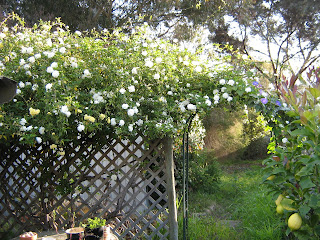The item on top of the work pile at the moment is a now very battered advance proof copy of a novel called The Little Shadows by the Canadian writer Marina Endicott, published in Canada last year and due for release in Australia in February. It's about a family in vaudeville, working the circuits along the border of the US and Canada; set from 1912-1917, it shows how their lives are affected by the forces of history.
With my curiosity piqued about vaudeville and its history in Australia -- obviously such an 'American' thing was going to make its way to Canada, but did it have a substantial history here? -- I went looking in the astounding new(ish) resource provided by the National Library, Trove, which -- well, go over there and have a look.
I spent many happy hours on this site last year and the year before when I was researching Adelaide and found, among other things, a great deal of family history buried among Family Notices and roundups from 'The Country', where the ferocious rivalry between my Scottish grandma and her bossy sister-in-law regarding the organisation of fund-raisers for the War Effort in Curramulka can be seen between the lines of often profoundly corrupted text.
Apropos of which, I decided early on that since this magical resource had been provided to me then the very least I could do was take an active part in the way it works: crowdsourcing to correct the scanned text, since obviously the resources don't exist for it to be done professionally. I decided that I would correct every article I used. There's no measuring this, but my guess is that, as with Wikipedia, the longer it goes on the more accurate it will be, as more and more people use it and contribute.
Anyway, vaudeville. Oh yes indeed. There's a thesis in this topic alone: 'Racism in the content and language of journalistic reportage of vaudeville in Adelaide, 1920-1940.' Here, for example, is a paragraph from The Advertiser of September 30, 1926:
CELEBRITY VAUDEVILLE.
Special interest is attached to the Southern Revue Company, which will be appearing for the first time in Adelaide at the Theatre Royal next Saturday, under the J. C. Williamson management. Many of the members of Joe Sheftell's revue are even blacker than negroes are usually painted, but this is not true about the chorus girls, who are much fairer than their men folk. One of the members of the company remarked while in Sydney "how mighty good every one has been to us." This is the first impression gained of Australia by one of the darkest of the members. He also explained that in the Land of Liberty "culled" folk have to travel in their own special "Jim Crow" railway carriages, and are segregated in special hotels and restaurants. This company includes many talented performers, who have been a great success in both Melbourne and Sydney — Minta Cato, the colored soprano; Joe Sheftell, the producer; Bob Williams, the comedian; McConn, Saunders, and Williams, the nifty steppers, and the chorus girls.Did you blanch over that word 'culled'? Language is a wonderful thing when it come to the return of the repressed. It took me a few seconds to work out that it was merely an attempt at phonetic approximation of the accent of the unnamed 'dark member' (oh dear, it just gets worse and worse) and his pronunciation of the word 'colored' (interesting that the Advertiser was using American spelling in 1926). I also enjoyed the snide reference to the Land of Liberty, implying that we in Australia have no such unenlightened attitudes, oh my wordy lordy no.
And as for the forces of history, I couldn't help noticing the tour dates on this one, from The Advertiser of September 21, 1929:
VAUDEVILLE
PERFORMANCE
Trixie Wilson, the well-known ballet teacher, announces that the annual concert to be given by her students will be held in the Thebarton Town Hall on October 22. The programme will contain several spectacular ballets, solo dances, and vaudeville acts.(And for anyone looking for ideas for fiction, there's a whole novel for you right there in the phrase 'Trixie Wilson, the well-known ballet teacher.') Unbeknownst to either the journalist or Miss Trixie, the 1929 Wall Street Crash was imminent: Black Thursday was October 24th, two days after the concert.
Vaudeville was a notoriously unstable and insecure profession even at the best of times, as Endicott's book makes clear, with acts being sacked and theatres closing down and impresarios going broke left and right. I wonder what happened to everyone in the wake of Black Thursday: to Miss Trixie, whose pupils' parents must have hurriedly reassessed whether the budget could stand ballet lessons? To those 'culled' troupers from three years before? To all vaudeville everywhere: the performers, the backers, the managers, the theatre owners, and the audiences, many of whom may have abruptly decided that going to the vaudeville was a luxury they could definitely do without? What happened to the nifty steppers, the Men of Mirth, the chorus girls, the acrobatic violinists and the 'Gypsy' dancers, in the wake of October 24th, 1929? Whatever did they do? Wherever did they go?



















